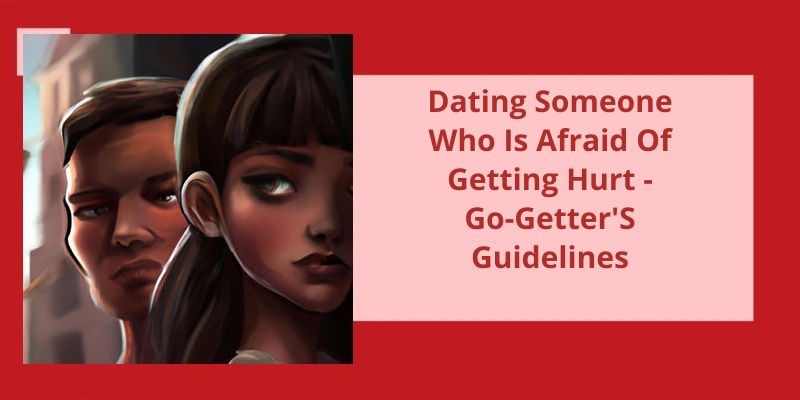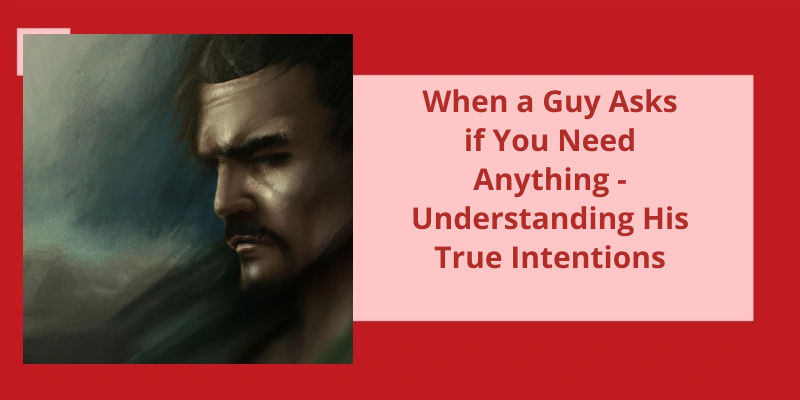When it comes to dating, one of the most common fears that people have is getting hurt. And while it’s natural to feel this way, it can be particularly challenging to navigate a relationship when your partner is afraid of getting hurt. The fear of emotional pain and vulnerability can lead to walls being built up, communication barriers, and even self-sabotage. In this guide, we will explore some guidelines that can help you navigate this delicate situation and build a strong and healthy relationship with someone who fears emotional vulnerability. From fostering open communication to practicing patience and reassurance, these guidelines will empower you to create a safe and supportive environment for your partner, allowing them to gradually overcome their fear and open up to love. So, if you’re ready to embark on this journey with your partner and help them navigate their fears, let's dive in and discover the go-getter's guidelines for dating someone who’s afraid of getting hurt.
What Is the Dating Fear of Getting Hurt?
Dating someone who’s afraid of getting hurt can be challenging, but with the right approach, it’s possible to navigate this fear and build a healthy, fulfilling relationship. This fear often stems from past experiences that have left an individual feeling vulnerable and hurt. They may have been in previous relationships where they were taken advantage of, betrayed, or abused, leaving them feeling like a victim.
One of the common characteristics of someone with the fear of getting hurt is their hypervigilance. They’re constantly on guard, looking for any signs of potential betrayal or abuse. This hypervigilance can manifest in various ways, such as constantly questioning their partners intentions, being overly jealous or suspicious, or always seeking reassurance. They may be quick to put up walls and keep their emotions guarded, fearing that opening up will lead to pain.
It’s essential for their partner to understand and acknowledge this fear, and to approach the relationship with patience, empathy, and sincerity. Building trust is crucial, and this can be achieved through open and honest communication. It’s important to create a safe space where both partners feel comfortable expressing their thoughts and feelings without judgment or fear of being hurt.
Cultivating a supportive and nurturing environment can help alleviate their fear of getting hurt. Showing consistent love, respect, and commitment can help build their confidence in the relationship and give them the reassurance they need. It’s important to be understanding and empathetic towards their fears, but also encourage them to challenge their negative beliefs and embrace vulnerability.
Above all, it’s essential to establish healthy boundaries. Both partners should communicate and agree upon the boundaries that feel safe and comfortable for both parties. This can help alleviate some of the anxiety and fear associated with getting hurt.
By creating a secure and trusting relationship, it’s possible to overcome this fear and build a strong foundation for lasting love and connection.
How to Recognize Signs of the Fear of Getting Hurt in Potential Partners
When dating someone, it can be important to recognize signs of their fear of getting hurt. These signs may manifest in various ways, such as a reluctance to fully open up emotionally or a tendency to avoid commitment. Pay attention to their behavior and communication patterns. If they constantly keep their guard up or hesitate to share personal information, it could be a sign of their fear. Additionally, if they frequently express concerns about past heartbreak or constantly question your intentions, these could be indications of their fear of getting hurt. It’s essential to have open and honest conversations about their fears to understand their perspective and decide if you’re both on the same page. Building trust and providing reassurance that you won’t intentionally hurt them can help alleviate their fears over time.
Navigating relationships can be a tricky process, and it isn’t uncommon to feel a certain level of fear or apprehension about the possibility of getting hurt. These anxieties can range from minor concerns to more overwhelming fears that may hinder the success of a relationship. While it’s natural to have these feelings, it’s important to recognize how our actions driven by fear can potentially cause harm to our relationships. Therefore, it’s essential to address and manage these fears in a healthy and constructive manner.
Is It Normal to Be Scared of Getting Hurt in a Relationship?
It’s completely normal to experience a certain level of fear when it comes to relationships. After all, opening yourself up to someone leaves you vulnerable to the possibility of getting hurt. However, it’s important to differentiate between healthy caution and letting your fear dictate your actions.
Being scared of getting hurt in a relationship is a defense mechanism that many people develop as a result of past experiences. Perhaps you’ve been hurt before, and now you’re hesitant to fully invest in a new relationship. It’s crucial to acknowledge and understand this fear, but also to not let it control your decisions.
While it’s okay to be fearful, it’s important to avoid acting out this fear in a way that may harm your relationship. Constantly questioning your partners intentions, being overly possessive, or even pushing them away to avoid potential pain can all sabotage the very relationship you’re trying to protect.
Communication is key in overcoming these fears. Talk to your partner about your concerns and work together to establish trust. By expressing your emotions and fears, you allow your partner to understand you better and offer reassurance. Learning to trust again takes time, but with open and honest communication, it’s possible to build a strong and secure foundation for your relationship.
In addition to communication, it’s important to focus on self-care and self-reflection. Take the time to understand your own fears and insecurities. By working on your own personal growth, you can become a more confident and emotionally secure individual, which will directly impact your relationships in a positive way.
Dont let your past experiences dictate your present relationship. Instead, take the necessary steps to address your fears and build a strong foundation of love, trust, and open communication.
Tips for Managing Fear and Anxiety in Relationships
- Practice communication and open dialogue with your partner
- Seek therapy or counseling to work through past trauma or relationship issues
- Practice self-care and engage in activities that promote relaxation and reduce stress
- Set boundaries and prioritize your own needs and well-being
- Engage in mindfulness or meditation to help manage anxious thoughts and feelings
- Challenge negative thoughts and reframe them in a more positive and realistic light
- Build a support network of trusted friends or family members
- Remember that fear and anxiety are normal emotions in relationships, but they shouldn’t control your actions or thoughts
- Educate yourself about healthy relationship dynamics and patterns
- Take breaks or create space when needed to reflect and recharge
Source: Is it normal to be so afraid of being hurt …
When a Guy Says He Is Afraid He Will Hurt You?
When a guy says he’s afraid he’ll hurt you, it could be an indicator of some deeper insecurities that he may have. It shows that he may have some unresolved emotional issues or past traumas that make him hesitant to fully commit and open up in a relationship. This fear could stem from previous experiences where he unintentionally hurt someone and doesn’t want to repeat the same mistake.
In some cases, when a person expresses this fear, it could also be a fair warning. It’s their way of communicating that they may not be fully ready or capable of handling a relationship at the moment. It’s important to take this statement seriously and respect their boundaries. Pushing someone to be in a relationship when they’ve expressed their fears can do more harm than good.
Building a deep and meaningful connection with someone takes time and effort. It can’t be rushed or forced. It’s important to understand that developing feelings of deep affection for someone doesn’t happen in just a few dates. In the initial stages of dating, it’s more common to experience feelings of shallow infatuation and lust. True love takes years of building trust, going through various trials, making sacrifices, and being there for each other through thick and thin.
If you find yourself dating someone who’s afraid of getting hurt, it’s crucial to communicate openly and honestly. Understand their fears and discuss ways in which you can both work together to build a strong foundation of trust and security. This may involve taking things slow, being patient, and giving each other the necessary space to heal and grow.
Ultimately, it’s important to remember that relationships are a two-way street. Both individuals need to be willing to work on their own insecurities and fears in order to create a healthy, long-lasting partnership. If someones fear of hurting you is too strong or if they’re unwilling to address their own emotional baggage, it may be necessary to reevaluate the relationship and prioritize your own emotional well-being.
How to Support Someone Who Is Afraid of Hurting You
- Be patient and understanding
- Listen actively to their concerns and fears
- Assure them that their feelings are valid
- Encourage open and honest communication
- Offer reassurance and support
- Suggest seeking professional help if necessary
- Respect their boundaries and comfort levels
- Provide resources or information on coping strategies
- Be there for them without judgement
- Help them develop a safety plan if needed
- Encourage self-care and stress management techniques
- Remind them of their strengths and capabilities
- Stay informed about their condition to better understand their experiences
Instead of facing the possibility of heartbreak, these men may choose to avoid fully committing or becoming emotionally vulnerable in their relationships. The fear of getting hurt can create walls and barriers, making it difficult for them to truly open up and trust their partner. This fear can stem from past experiences, personal insecurities, or a general fear of intimacy. Understanding and addressing these fears is important for fostering a healthy and fulfilling relationship.
What Makes a Man Scared in a Relationship?
They may struggle to trust their partner fully, fearing that they’ll be vulnerable and end up being hurt in the process. Insecurity can play a big role in this fear, as they may question their own worthiness of love and worry that they’ll not be enough for their partner. This fear of getting hurt can manifest in various ways, such as distancing themselves emotionally, sabotaging the relationship, or even avoiding commitment altogether.
Communication also plays a significant role in a mans fear of getting hurt. If they feel like they can’t openly express their thoughts and emotions to their partner, they may fear that their needs and concerns will be dismissed or ignored. This fear can stem from past experiences where their attempts to communicate were met with rejection or criticism. As a result, they may build walls and keep their guard up to protect themselves from potential emotional pain.
They may worry that committing to a long-term relationship will restrict their personal space and limit their individual pursuits. This fear can stem from a desire to maintain a sense of control and autonomy in their lives. They may fear losing themselves in the relationship and becoming dependent on their partner for their happiness and fulfillment.
Lastly, societal expectations and gender norms can also play a role in a mans fear of getting hurt. Men are often expected to be strong, tough, and emotionally resilient. Showing vulnerability or admitting fear can be seen as a sign of weakness, which can create additional pressure and anxiety in relationships. They may fear being judged or ridiculed by others for expressing their fears and concerns, leading them to suppress their emotions and avoid potential emotional pain.
Understanding and addressing these fears can help create a safe and nurturing space where both partners can grow and thrive together.
You should never sacrifice your happiness for someone who’s unwilling to confront their fears. Instead, be open and honest with your feelings, communicate your needs, and be prepared to walk away if necessary. Remember, you deserve someone who’s capable of giving and receiving love fully.
How Do You Deal With a Guy Who Is Scared of Love?
This can be a delicate situation to navigate, as it requires finding a balance between being there for your partner while also taking care of yourself. One of the most important things to do is to communicate openly and honestly with your partner about their fears and anxieties. Understand that their fear may stem from past experiences or emotional wounds, and it may take time for them to trust and feel safe in a romantic relationship.
Listen attentively and validate their emotions, showing empathy and understanding. Reassure them that you’re there for them, and that you’re willing to be patient and give them the time and space they need to overcome their fears.
It’s important to avoid putting pressure on your partner or trying to force them to change. Allow them to set the pace for the relationship, and respect their boundaries. While it’s natural to want reassurance and commitment in a relationship, pushing too hard may cause your partner to withdraw further. Instead, focus on building trust and creating a loving and supportive environment.
Take care of yourself during this process as well. Set boundaries that protect your emotional well-being and ensure that you aren’t sacrificing your own happiness for the sake of the relationship. It’s essential to nurture your own needs and feelings, and seek support from friends, family, or professionals if needed.
Recognizing Signs of Commitment Phobia and Understanding It’s Causes
- Fear of long-term commitment
- Avoidance of serious relationships
- Difficulty in expressing emotions
- Tendency to sabotage relationships
- Frequent excuses for not committing
- Anxiety about future plans
- Tendency to prioritize independence
- Lack of trust in romantic partners
- Hesitation to make future commitments
- Fear of being vulnerable in a relationship
- History of short-lived relationships
- Desire for freedom and flexibility
- Difficulty in envisioning a long-term future with a partner
- Tendency to maintain emotional distance
- Anxiety about being tied down
In order to have a healthy and fulfilling relationship, it’s important to understand and address the fear of abandonment that can often manifest in various ways. By delving into the root causes of this fear and working through it with open communication and compassion, individuals can build stronger and more secure connections with their loved ones.
What Is the Biggest Fear in Relationship?
One of the biggest fears in a relationship is the fear of abandonment. This fear is deeply ingrained in our human psyche and can often stem from past experiences and childhood traumas. When someone has experienced abandonment in their past, either through a loss or a betrayal, it can leave a lasting impact on their ability to trust and open up in future relationships.
It requires patience, empathy, and the willingness to create a safe and secure environment for the person to heal and grow. It’s important to remember that this fear isn’t a reflection of the relationship or the current partner, but rather a result of past experiences that have left deep wounds.
As a go-getter in a relationship with someone who’s afraid of getting hurt, it’s essential to approach their fear with compassion and understanding. Avoiding judgment and being patient while they work through their fears can help create a sense of safety and trust in the relationship.
In addition to emotional support, it may be helpful to encourage your partner to seek therapy or counseling. Professional help can provide them with the tools and guidance necessary to address their past traumas and fears. Ultimately, the key to dating someone who’s afraid of getting hurt is to foster open communication, emotional support, and a safe space for healing.
The Impact of Past Traumas on Relationships
Past traumas can have a significant impact on a person’s ability to form and maintain relationships. When someone has experienced hurtful or traumatic events in their past, they may develop a fear of getting hurt again. This fear can manifest in various ways, causing them to avoid emotional intimacy or to constantly question their partner’s intentions.
Individuals who’ve been hurt in previous relationships may struggle with trust issues, making it challenging for them to open up and be vulnerable. They might also have a heightened sensitivity to potential signs of rejection or betrayal, leading them to overanalyze and overthink their partner’s actions or words.
It’s crucial for partners of individuals who’re afraid of getting hurt to provide patience, understanding, and support. Building trust gradually and communicating openly about fears and insecurities can help create a safe space for healing and growth within the relationship.
Professional help, such as therapy, can also be beneficial in dealing with past traumas and their impact on relationships. Therapists can guide individuals in processing their emotions, developing healthy coping mechanisms, and learning to trust again.
Overall, dating someone who’s afraid of getting hurt requires empathy and a willingness to navigate the complexities that arise from past traumas. With time, patience, and the right support, it’s possible for individuals to heal and form fulfilling relationships.
Conclusion
It’s essential to understand that their fear may stem from past experiences, and their walls may take time to come down. Patience, open communication, and a willingness to create a safe and secure environment are key to fostering trust and showing them that love can be a beautiful and healing experience. By respecting their boundaries, supporting their growth, and being empathetic to their fears, we can help them overcome their insecurities and build a strong and lasting connection. Ultimately, love can heal even the deepest wounds, and by embodying the qualities of a go-getter, we can create a vibrant and cherished relationship with someone who’s the potential to surprise us with their capacity for love and vulnerability.






